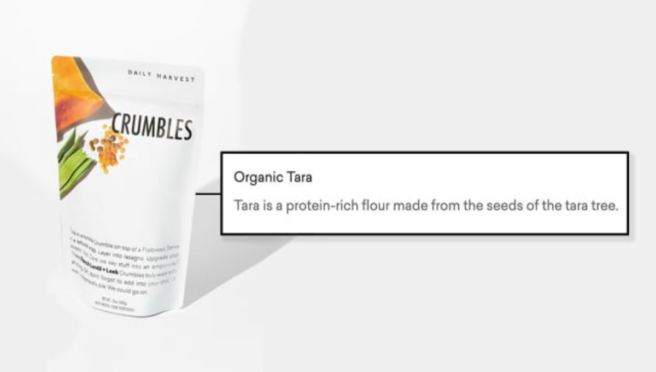Researchers have found that tara flour was the culprit in an outbreak of hundreds of illnesses associated with Daily Harvest French Lentil & Leek crumbles.
The researchers from the University of Mississippi discovered that a component of tara flour, which is made from the seeds of a plant grown in Peru, was likely behind the illnesses that spanned 39 states in 2022. That component, baikiain is a nonprotein amino acid and is present in high levels in tara.
The researchers published the study in “Chemical Research in Toxicology,” which is an American Chemical Society Journal. The authors are part of the National Center for Natural Products Research, which is partly funded by the Food and Drug Administration.
The researchers stated that their objective was to undertake a multipronged pharmacognosy approach to assess the quality and safety of the tara flour ingredient within the Daily Harvest’s Crumbles product.
They concluded that “adverse events” reported by people who had consumed the Daily Harvest crumbles originated from the tara flour ingredient.

Tara flour was not used in any other Daily Harvest products, but tara protein was used in Revive Superfoods Mango and Pineapple smoothies. A number of consumers who drank those smoothies reported illnesses consistent with those reported by the patients who ate the Daily Harvest frozen crumbles.
Outbreak investigators were stumped by the illnesses traced to the Daily Harvest crumbles, which included at least 393 people, many of whom required hospitalization. About 30 had to have their gallbladders removed.
The outbreak began in April of 2022 and continued to at least September that year, according to federal officials. People started reporting illnesses shortly after the Daily Harvest Lentil & Leek frozen crumbles were introduced to the public.
During the outbreak the owners of Daily Harvest and investigators from the Food and Drug Administration tested the frozen crumbles product. None of the tests revealed any common food toxicantsmicrobial pathogens, mycotoxins, major allergens, heavy metals, pesticides, hepatitis A or norovirus.
In February this year FDA scientists hypothesized that the illnesses were linked to the tara flour, but they stopped short of saying that the tara component was the culprit in the outbreak.
Professor Ben Chapman, Department Head and Food Safety Specialist for the Department of Agricultural and Human Sciences at North Carolina State University, said the new study out of Mississippi University is based on sound science and appears to resolve the mystery behind the Daily Harvest illnesses.
“This outbreak has stumped many of us in the food safety world over the past year. Without a common pathogen or toxin, there certainly appeared to be something going on that led to hundreds of serious illnesses,” Chapman told Food Safety News.
“The authors present a very compelling case for amino acid, baikiain, being a possibility as the causative agent for these illnesses. What I liked about this study is the they went in-depth on what is in this relatively newly used — in high-protein foods — and novel tara flour, and found that there was a detectible amino acid that has no published toxicological or safety assessment studies about it in the literature.”
Don Schaffner, an Extension Specialist in Food Science and Distinguished Professor at Rutgers University, had comments similar to those of Chapman. Schaffner said an important aspect of the study is the effort the authors to establish that what they were testing was actually botanically the correct species.
“In terms of the central findings of the article, the authors have done a good job of showing that the nonprotein amino acid baikiain is present in the tara flour and that it causes effects in male mice that are consistent with liver damage and the effects seen in humans,” Schaffner told Food Safety News.
“The authors have convinced me that they have figured out the correct cause of the illnesses in humans epidemiologically linked to tara flour.”
Chapman was also convinced that the authors of the story had found significant evidence linking tara flour in the Daily Harvest crumbles to the hundreds of illnesses recorded in 2022.
“I’m not sure this is a smoking gun or anything that definitive but it definitely provides data for others to investigate the toxicity of the protein source further,” Chapman said.
“I think things like this demonstrate how complex food processing is — like adding a high protein flour in a high dose to a really popular product can have unintended consequences like these illnesses and outbreak — highlighting to me the importance of making sure that new/seldom used ingredients are assessed by manufacturers, in conjunction with regulators, before putting it out there.”
Chapman also noted the significance of the researchers work in the labotarory, noting that they fed baikiain to mice, at a dose similar to what might have been provided in the Daily Harvest product and found that the mice exhibited liver and kidney impacts similar to overdoses of acetaminophen as the baikiain breakdown in the body created a metabolite that’s similar to the common OTC drug.

